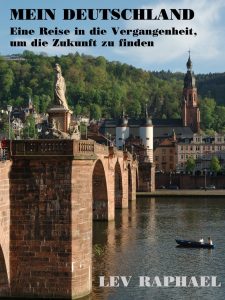I get that question all the time at readings.
The answer doesn’t pop up immediately, because I’ve published in so many genres: memoir, mystery, literary novel, short story collections, psychology, biography/literary criticism, historical fiction, Jane Austen mash-up, vampire, writer’s guide, memoir-essay collections.
I love them all, or I wouldn’t have written them, but my 19th book My Germany has a special place in my writer’s heart. It’s more deeply personal than my other books, and it’s also the one I struggled with most.
![[cover]](http://www.levraphael.com/images/cover_mygermany_152.jpg)
I’m the son of Holocaust survivors, and the book is a combination of history, family history, travelogue, mystery, and a coming out story. The thread that connects it all is my exploration of the role that Germany–real and imagined–played in my family while I was growing up and in my own life as an adult and an author.
It wasn’t an easy set of stories to tell. It took me more than five years to figure out the book’s structure and to let go of trying to force it into a specific mold. I finally realized that I could blend genres, and that set me free to follow the advice the poet Sir Phillip Sydney’s muse gave to him: “Look in your heart, and write.”
My Germany is also the book that garnered me the most speaking gigs of any book in my career: somewhere between fifty and sixty. That included two book tours in Germany where I spoke in over a dozen different cities, and sometimes even read from it in German, which I had started studying in night classes.
Unexpectedly, I felt comfortable the moment I got to Germany and I remembered something I’d somehow completely forgotten: I grew up in New York’s Washington Heights neighborhood, where thousands of neighbors were German refugees from the Nazis. I’d been hearing German in the streets, in stores, in our building’s lobby and elevator since childhood. So suddenly plunging into a German-speaking environment wasn’t strange; it was comforting, it made me feel at home.
 That was one of the many surprises connected to writing My Germany, and it made clear to me the power that memoir has to connect you to your own past in new, revelatory ways. I was changing, which is why I had to write that memoir, and writing it changed me even more. A colleague once said that writing is a process of discovery; well, that book opened up new worlds for me, and having just taught an online memoir writing workshop this past month, I’ve seen memoir do that for my students, too. It’s thrilling.
That was one of the many surprises connected to writing My Germany, and it made clear to me the power that memoir has to connect you to your own past in new, revelatory ways. I was changing, which is why I had to write that memoir, and writing it changed me even more. A colleague once said that writing is a process of discovery; well, that book opened up new worlds for me, and having just taught an online memoir writing workshop this past month, I’ve seen memoir do that for my students, too. It’s thrilling.
Lev Raphael is the author of 25 books in many genres, including the guide for writers, Writer’s Block is Bunk. You can take writing workshops with him online at writewithoutborders.com.“Studying creative writing with Lev Raphael was like seeing Blade Runner for the first time: simply incredible.”—Kyle Roberts, MSU Class of 2016
